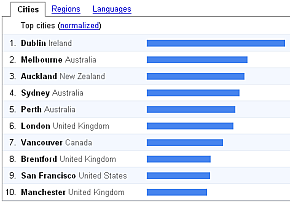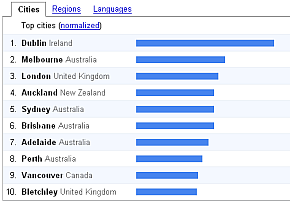What’s new in Inform 7?
June 1st, 2006Inform 7 was released on 30 April 2006, ten years to the day since the last major upgrade of the Interactive Fiction authoring system. And it’s an exciting leap forward Read the rest of this entry »
Inform 7 was released on 30 April 2006, ten years to the day since the last major upgrade of the Interactive Fiction authoring system. And it’s an exciting leap forward Read the rest of this entry »
These days a commercial computer or video game requires a battalion of programmers, graphic artists, animators, writers, actors, and miscellaneous other contributors - probably about as many people as a modest movie production. But thanks to tools like Inform and TADS Interactive Fiction is still within the scope of a single author, hence the enduring attraction of IF for “after-hours” programmers. A programmer with a creative bent or a writer willing to learn to program can turn out a decent Interactive Fiction story while holding down a “real” job or full time study Read the rest of this entry »
There’s very little required to start playing with Interactive Fiction: install an interpreter and download some game files then you’re ready to roll Read the rest of this entry »
Sometime back in the early 1980s I booted the family computer (a TRS-80 Model I, if memory serves) and loaded a new program we had just acquired. In flickering green letters a strip of text appeared across the top of the screen:
I’m in a forest
Obvious exits: NORTH SOUTH EAST WEST
Visible items: Trees
Then below that:
A voice BOOOOMS out: Welcome to Adventure International’s Mini-Adventure Sampler! This is a small but complete Adventure. You must find the 3 hidden Treasures and store them away! Say: score to see how well you’re doing! Remember you can always say HELP
WHAT SHALL I DO?
This was a free sample of “Adventureland”, the first in a series of about a dozen text adventure games by Scott Adams and his company Adventure International Read the rest of this entry »
According to a report in The Age, Melbourne is the second most lonely city in the world - based on a Google Trends search for the word “lonely”. Talk about drawing a long bow!
A search today shows the following as the top ten searchers for “lonely”:

But how about searching for “lonely planet”:

That’s almost identical, isn’t it? I think The Age could just as easily have reported that Melbournians (indeed, Australians in general) are avid consumers of travel guide books.
Even trying some synonyms like alone, loneliness, and isolated don’t show anything conclusive.
Why?
The Google Trends about page explains:
Keep in mind that instead of measuring overall interest in a topic, Google Trends shows users’ propensity to search for that topic on Google on a relative basis. For example, just because a particular region isn’t on the Top Regions list for the term “haircut” doesn’t necessarily mean that people there have decided to stage a mass rebellion against society’s conventions. It could be that people in that region might not use Google to find a barber, use a different term when doing their searches, or simply search for so many other topics unrelated to haircuts that searches for “haircut” make up a very small portion of the search volume from that region when compared to other regions.
One could substitute “lonely” for “haircut” in that explanation and using Google Trends data to conclude that Melbourne is the second most lonely city in the world is shown to be incredibly foolish.
Apparently the story originates from Reuters. Wherever it came from, that’s sloppy, sloppy journalism.
Have a look at this interview:
Big blunder, but nice recovery and bluffing from the interviewee who was, according to the Sydney Morning Herald, a London cabbie who
suffered an awkward few moments of fame when the BBC mistook him for a computer expert and interviewed him live on the flagship News 24 channel.
The real expert was Guy Kewney, a journalist specialising in computer issues who had been invited to comment on Apple Computer’s legal battle with Apple Corporation, the Beatles’ music publishing company.
As Joshua Gans says: not even on Frontline would you see such a priceless moment as this - truth is funnier than fiction.
The BBC wouldn’t even share the video with the Guy they meant to interview, which is a bit rude I think…
Mind you, the Guy they got sounds surprisingly lucid for someone who was making it up on the spot. Of course real industry experts would never do that, would they?
According to a report The Age today, the BBC
realised too late that they had put on Guy Goma, a Congolese man applying for a technology-related job.
You can imagine how the conversation went at reception:
“Hello. My name is Guy and I’m here for an interview.”
“Right, Mr [checks interview schedule] Kewney, just step into this studio and we’ll get you some make-up.”
Earlier reports that the wrong Guy was a taxi driver were apparently incorrect.
Oh wow!
I haven’t had a look at anything Interactive Fiction for ages but things have kept moving along. Inform, one of the big two authoring systems, has just gone to version 7 with a stack of features. And is that a spiffy new IDE I see there?
I notice this version has been a real team effort with recognisable names like Emily Short and Andrew Plotkin being added to Graham Nelson’s in the credits.
OK, downloaded and ready to play - it looks like I’ve got a few more wasted weekends ahead!
SketchUp is one of those cool tools that even design-impaired plonkers like me can get excited about. It’s a 3D modelling tool that’s not quite CAD, but much more than a toy. But no matter how interesting it sounded I was never quite excited enough to fork-over the US$500 to get hold of it.
Well it appears that Google also liked it. In fact they liked it so much that they bought the company (@Last Software). And yesterday they released a free-for-personal-use version of SketchUp Read the rest of this entry »
There are some web sites to which you keep returning. Maybe not every day or even every week - but you keep going back. They are the kind of sites that never fail to delight. Such sites very quickly become old favourites; so maybe they are old news but that doesn’t mean you don’t keep revisiting them.
For example, let me give you “Reader’s Indigestion”: three sites that help this bookhound satisfy his reading appetite Read the rest of this entry »
So the Classification Review Board has banned another video game in Australia. This time it’s Marc Ecko’s Getting Up: Contents Under Pressure. And in what way has this game offended the censor? It promotes graffiti.
Yep, that’s right. Graffiti. Read the rest of this entry »
Target.com is currently the subject of litigation over poor web site accessibility:
The US National Federation of the Blind (NFB) has brought legal action against Target corporation (a major US-based discount retailer which operates more than 1,300 stores in 47 states) because their web site is not accessible. The NFB has raised the issue with Target Corporation before
It seems that some of the accessibility blunders are pretty fundamental (lack of alt tags, image maps without alternatives) but some actions can not be performed on target.com at all without using a mouse.
And here’s a real gem of good advice:
Word to the wise - if you are making accessibility changes to your site based on feedback - make sure you document your process so that you can at least show that you’re doing something to address the issues, and if you are doing it incrementally make some sort of public announcment with each improvement you make, ok? You know - that would make good business sense.
(via molly.com)
Following the recent nonsense over the Firefox Myths web page, it’s interesting to see in Information Week that more data has come to light about spyware and browsers.
Researchers at the University of Washington have been looking at the prevalence of spyware on the web, and in the process they did a side by side comparison of spyware attacks on IE and Firefox. Read the rest of this entry »
On his blog Tim Bray recently offered some advice on protecting your data - it’s backup advice for the rest of us Read the rest of this entry »